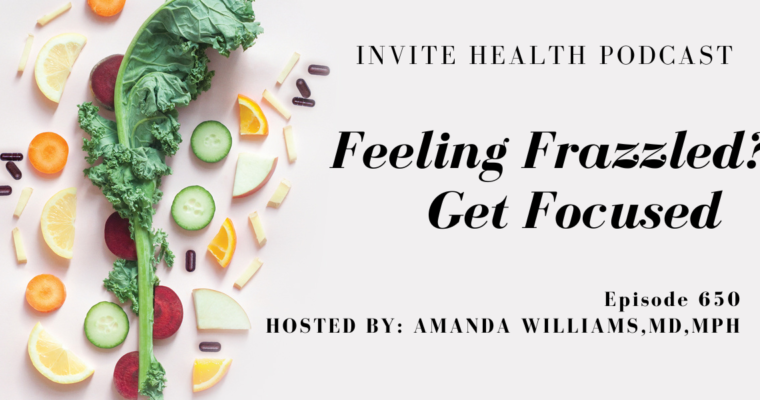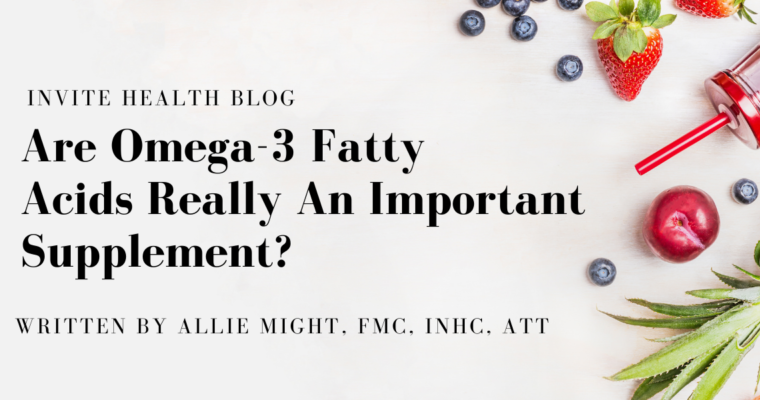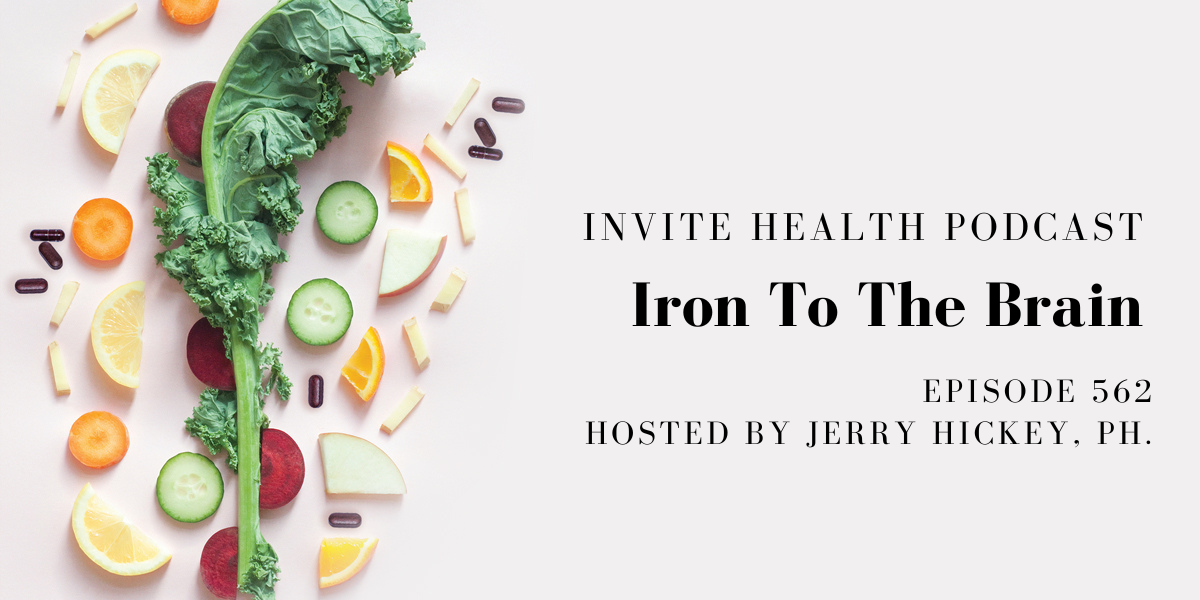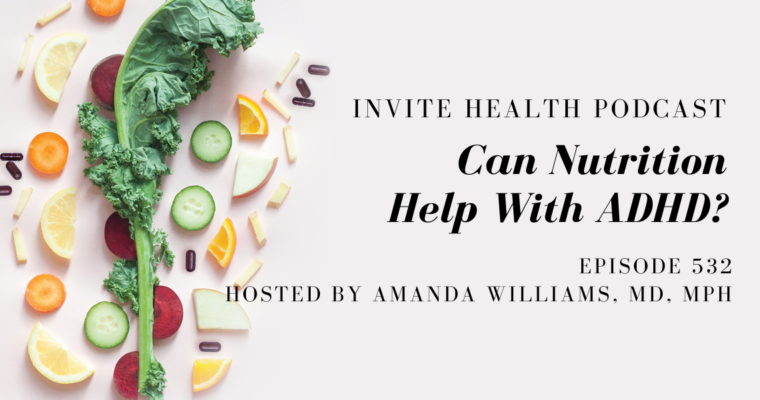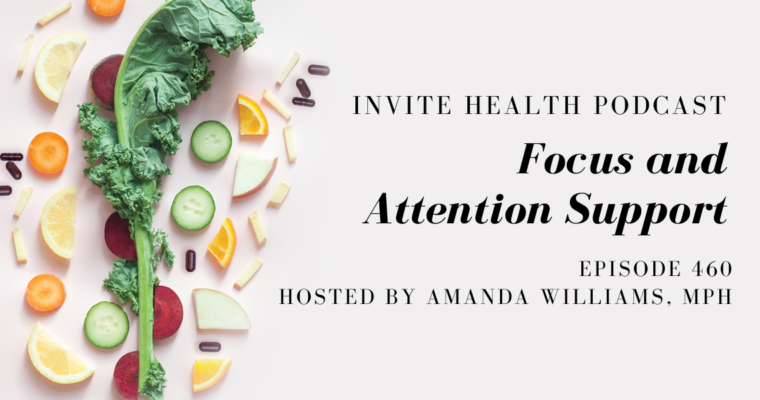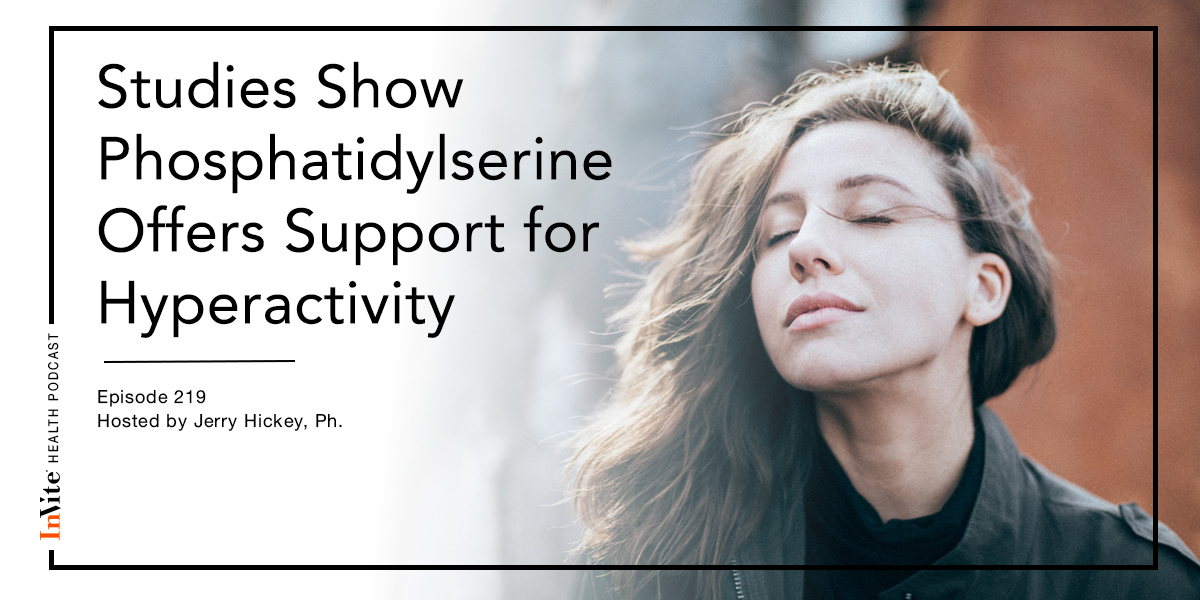Iron
Subscribe Today!
Please see below for a complete transcript of this episode.
Iron To The Brain – InViteⓇ Health Podcast, Episode 562
Hosted by Jerry Hickey, Ph.
*Intro music*
InViteⓇ Health Podcast Intro: Welcome to the InViteⓇ Health Podcast, where our degreed healthcare professionals are excited to offer you the most important health and wellness information you need to make informed choices about your health. You can learn more about the products discussed in each of these episodes and all that InViteⓇ Health has to offer at www.invitehealth.com/podcast. First time customers can use promo code PODCAST at checkout for an additional 15% off your first purchase. Let’s get started!†
*Intro music*
Jerry Hickey, Ph. : [00:00:40] Iron is best known for its effects on our blood, on our hemoglobin, and for treating anemia. In fact, iron deficiency is thought to be the most common deficiency worldwide. And iron, of course carries the oxygen in our blood to give us energy. Similarly, iron is used in our muscles to make myoglobin for muscle energy to hold oxygen in our muscles. But iron is used in many, many ways throughout our body, our immune systems use it, etc.. However, iron is incredibly important for our brain. † [00:01:14]
[00:01:15] So hi welcome to my episode iron for your brain. My name is Jerry Hickey, I’m a nutritional pharmacist, a licensed pharmacist specializing in nutrition. I’ve studied this for many decades, by the way. Welcome to my episode. You could find all of our episodes for free wherever you listen to podcasts, or just go to invitehealth.com/podcast. And please, if you could subscribe and leave us a review, it’d be helpful. You can also find InViteⓇ on Instagram and Twitter and Facebook at InViteⓇ health.† [00:01:46]
[00:01:46] So let me get going with this explanation. I’ll explain what hemoglobin and myoglobin are. How much iron do you need? There’s about 3000 to 4000 milligrams of iron in our entire body, so that’s less than a teaspoon and it’s found mostly in our hemoglobin. So iron is at the core of hemoglobin. So I like to tell people, picture a red blood cell as a balloon. As a balloon, it could be yellow. It could be orange, it could be green. I learned this at a lecture in a hospital in New York City many years ago, using this as an example. It’s a very good example of what hemoglobin is. So our red blood cells could be yellow or blue or green that would refer to our blood type like type A or type B or type O. But inside red blood cell, it’s all the same, it’s all red. And that’s because of the hemoglobin. The cored hemoglobin is iron, because iron your blood is passing by your lungs at a very fast rate. Iron is equipped to grab the oxygen in the lungs and deliver it throughout the body. It’s very sensitive to the needs of different organs and tissues and releasing the iron where it’s needed. So in a similar fashion. So you need iron obviously for energy if it’s carrying oxygen around the body. But in a similar way, it makes myoglobin in your muscles and myoglobin carries oxygen in the muscles.† [00:03:22]
[00:03:23] But iron is extremely important for the brain. First of all, in the brain, iron protects the brain in many ways. In the brain not only does iron supply oxygen, it protects the brain from the utilization of oxygen for energy. So the brain is a super high energy organ. It uses a lot of sugar, it uses a lot of oxygen. A byproduct of this is something that’s very unstable, called hydrogen peroxide, which can leak out of the cells and it’s highly corrosive. It can hurt our brain cells anywhere within the cell. So you need something to prevent that from happening. So a byproduct of of energy production in the brain and everywhere else in the body is a release of hydrogen peroxides, which are very reactive and unstable and can damage our cells. An antioxidant is active throughout the body, especially in the brain and in the liver called catalase and catalase breaks down as hydrogen peroxide before it can damage you. It breaks down the hydrogen peroxide into oxygen and water, which are obviously highly, highly utilizable but catalase protects the brain in another way. It breaks down alcohol if you couldn’t break down alcohol, it would poison you. Catalase triggers the formation of acid aldehyde out of the alcohol so you can clear it out of your brain. So besides bringing oxygen to the brain for brain energy. Iron is at the core of protecting the brain as an antioxidant from degeneration of the cells. Because at the core of these catalase molecules is iron.† [00:05:14]
[00:05:16] Now, iron also is needed for thyroid function, and this is important iron deficiency anemia, which is a severe lacking of iron. It’s a severe lacking of iron. By the way, how much iron is a person typically need? And adult male needs about eight milligrams of iron every day. And adult female needs about 18 milligrams of iron every day. But of course, she needs more if she’s pregnant. And they say that the need for ironing declines with age, I think that’s yet to be totally established. So you need iron for thyroid function. Iron deficiency anemia leads to a blockage of thyroid hormone production. This affects your energy and your metabolism, which of course affects your brain. Now, iodine can help a little bit, but iron is absolutely needed. How important is iron for the brain? And children iron is critical for the formation of the brain and nervous system. And if a child has low iron, if a child is chronically low in iron, very low in iron, they have poor cognitive development, poor school performance, abnormal behavior and going in a different direction a little bit. There’s some evidence that people and children with ADHD have a difficulty in utilizing iron in their brain.† [00:06:44]
[00:06:47] For instance, there was a study in the Archives of Pediatrics and Adolescent Medicine, and he found that in 84% of the children with ADHD in their study, they were low in iron. And depending on how low it was, it correlated to how severe their symptoms of ADHD were. But that’s really needing more research. But there seems to be a correlation that if you’re low in iron, that’s going to cause your ADHD to be a little bit more severe. Now, another way that iron affects the brain is iron deficiency is often related to sleep disorders. For one thing, you can have restless leg syndrome where you get these leg cramps, these vague leg cramps, and you have to move your legs around and you can’t sleep. But they’re finding that iron in general. If you lack it, it affects your ability to sleep. So they don’t quite understand what’s going on there. But there’s many studies showing this.† [00:07:46]
CAN NUTRITION HELP WITH ADHD? – INVITE HEALTH PODCAST, EPISODE 532 >> Listen Now!
[00:07:48] Now, sleep is needed for you to break down toxins in the brain. You have something called the lymphatic system that’s active at night when you go to deep sleep. And by the way, the best position for sleeping, for improved detoxification of the brain is on your side, not on your stomach, not on your back, but on your side. There’s an improved lymphatic activity. So that lymphatic activity breaks down the plaques, you know, plaques related to damage in the brain and Alzheimer’s, etc. So it’s really important for that. That happens during deep sleep, which is called non-REM sleep or Delta wave sleep. But it’s also important for learning, in our neurons there’s actual during REM sleep rapid eye movement where you eyes are darting all over the place and you’re dreaming. You have these bursts of energy from your brain cells and you’re calm, you’re compartmentalizing memories. So when you learn something in the daytime, you store it in a part of the brain called the hippocampus. But the hippocampus is not huge and it’s prone to issues. So at night, so it’s a short term storage area for your memories. At night when you go into deep sleep and REM sleep, you’re you’re especially REM sleep. You’re moving those memories from the hippocampus, short term storage to long term stor age sites. So you need sleep for learning, but you also need deep, deep sleep for cognitive reserve, developing cognitive reserve. When you go into deep sleep the same time, when you’re detoxifying the brain with the lymphatic system, you’re also releasing brain derived neurotrophic factor, which triggers the formation of hundreds of new healthy memory cells. And if you create a new sufficient levels of new healthy memory cells, your brain goes on working. Even if you have some damage in the brain that’s related to Alzheimer’s, or if you’re very depressed, you get a turnaround because these new cells are magnificent, they’re healthy, they haven’t been damaged or tainted by depression. So your mood can improve and they haven’t been damaged by the Alzheimer’s plaques. So your memory goes on working. † [00:10:07]

[00:10:09] Now, unfortunately, the release of brain derived neurotrophic factor declines with age, a substance called turmeric, which contains things like aromatic Tiburon and bismuth oxide curcuminoid and curcuminoid has been proven in about five years in clinical trials to stimulate the release of brain derived neurotrophic factor when you sleep at night. So that helps long term memory. So that’s one way of helping it. And a way of helping brain detox, by the way, because that declines with age to the formation of new memory cells defines with age because it released less and less brain derived neurotrophic factors. So turmeric can help you with that. So can zinc, so can exercise. And of course, getting enough sleep and eating vegetables. As far as the detoxification of the brain, that seems to be more fish oils and possibly resveratrol.† [00:11:02]
[00:11:04] Now let’s go on and discuss other ways that iron is good for the brain. Lead is extremely toxic you find lead in old pipe joints and you find lead in old, old paint and you find lead and in gasoline, of course, especially older gasoline. And the highest level of lead in most people’s houses is at the entrance by the entrance, because you’re the lead is all over the environment and you attract the lead into the house so right by your front door. Inside your front door is your highest level of lead in the house. Unless you have an older house with lead based paints and lead based pipe fittings. Lead people at lead poisoning. You’ll see that their wrists droop because it affects their muscles and nerves. They’re very listless. They get a black line around their lips, but it really affects their brain. I mean, it really affects their brain. It affects their IQ, their intelligence. Iron is needed to blocking lead from entering the brain. So that’s another way that iron helps the brain. It protects the brain in several ways. There’s evidence that if you have too little iron, you have a higher risk of Parkinson’s disease and the back of the brain by the dentate gyrus, the substantia nigra. A partial impact that’s involved with movement with muscle function ect, and balance and mobility. And there’s a a balance there between dopamine and acetylcholine and iron is involved there. That’s why it looks so dark and lacking. Iron seems to increase the risk of Parkinson’s disease. There’s a little bit of information that lacking iron increases the risk of Alzheimer’s disease, and that’s because people tend to have lower catalase activity. But that still has to be demonstrated. The other thing is strokes. There’s a higher risk of a stroke in people with low iron. † [00:13:23]
[00:13:26] So I wouldn’t just go out and get an iron supplement. The normal amount of iron you’ll find in most multivitamins is fine, like eight or ten milligrams. But iron supplements are much more concentrated. Now as far as iron supplements, the best one out there is iron bisglycinate. Iron bisglycinate the ones doctors normally recommend, is a ferrous sulfate, or Iron sulfate. That’s very constipating, it causes nausea, it’s really not that well absorbed. Iron bisglycinate is much better absorbed, twice as well absorbed as the iron sulfate. As the ferrous sulfate, it’s twice as well absorbed. It doesn’t cause nausea and it doesn’t cause constipation. Why not? See the reasons some irons cause nausea and constipation is they’re absorbed poorly and slowly, so their hanging out in the intestines, causing a little damage. If you get a better absorbed iron, it’s not causing those problems. So the iron bisglycinate is much gentler as far as that goes. So if you have to take an iron, my recommendation would be to iron bisglycinate and always take it with food.† [00:14:36]
[00:14:37] Now there’s associated nutrients like vitamin C, why is vitamin C important? A lot of things in food can trap iron like things in whey and things in eggs and the egg yolk and the egg white, black tea is notorious for trapping iron. Vitamin C protects the iron and allows it to be absorbed. So vitamin C is needed for iron absorption generally because you really need to take iron with food. And you have to block the effects of anti-nutrients on the iron. B12 and folate and taurine are needed to interact with iron to create hemoglobin in your red blood cells? Taurine is a soft hydrated amino acid. It’s kind of a very distinct type of nutrient. Methyltetrahydrafolate is the active form of folic acid. That’s the kind of generally recommend you don’t want to synthetic folate, you get it called folic acid and most multivitamins and B12, they’re needed for the creation of hemoglobin. † [00:15:37]
THE MULTIPLE USES OF VITAMIN C IN THE BODY – INVITE HEALTH PODCAST, EPISODE 478 >> Listen Now!
[00:15:39] Now, copper is needed for iron metabolism. For iron to function properly, you need copper. You need copper for red blood cell formation. The reason for this copper is carried around a body and something called surreal plasmine that delivers copper in the body that’s needed for iron metabolism, for iron to work properly. Now you can’t take copper at the same time as iron because the iron will grab the copper and you won’t absorb it. So that’s a weird thing. You need the copper for the iron to work, but you have to take it at a separate time. Zinc is also needed. Your kidneys release a hormone called erythropoietin, and that triggers the formation of red blood cells. Zinc is needed for this function. You need zinc to create red blood cells. But oddly, again, you can’t take zinc at the same time as you take iron. They’re both devilline minerals, copper, iron, zinc, they’re all devilline minerals. And they grab onto each other and you won’t you won’t absorb them. So take your iron separate from your zinc. So that’s what I have to say. Iron really has we’ve already spoken about iron as one of the nutrients that’s important for your immune system. The immune system uses iron to all to kind of like overdose bacteria and viruses. Now, these are very interesting, these minerals. † [00:17:03]
[00:17:05] So in any event, thank you for listening to today’s episode. You can find all of our episodes for free wherever you listen to podcasts, or just go to invitehealth.com/podcast. And if you can leave us a review and and a subscription, that’d be great. You can also listen to InViteⓇ Health on Twitter and basically any any of the social media sites at Invite Health. I want to thank you for listening today. This is Jerry Hickey sounding off. † [00:17:05]
*Exit Music*


